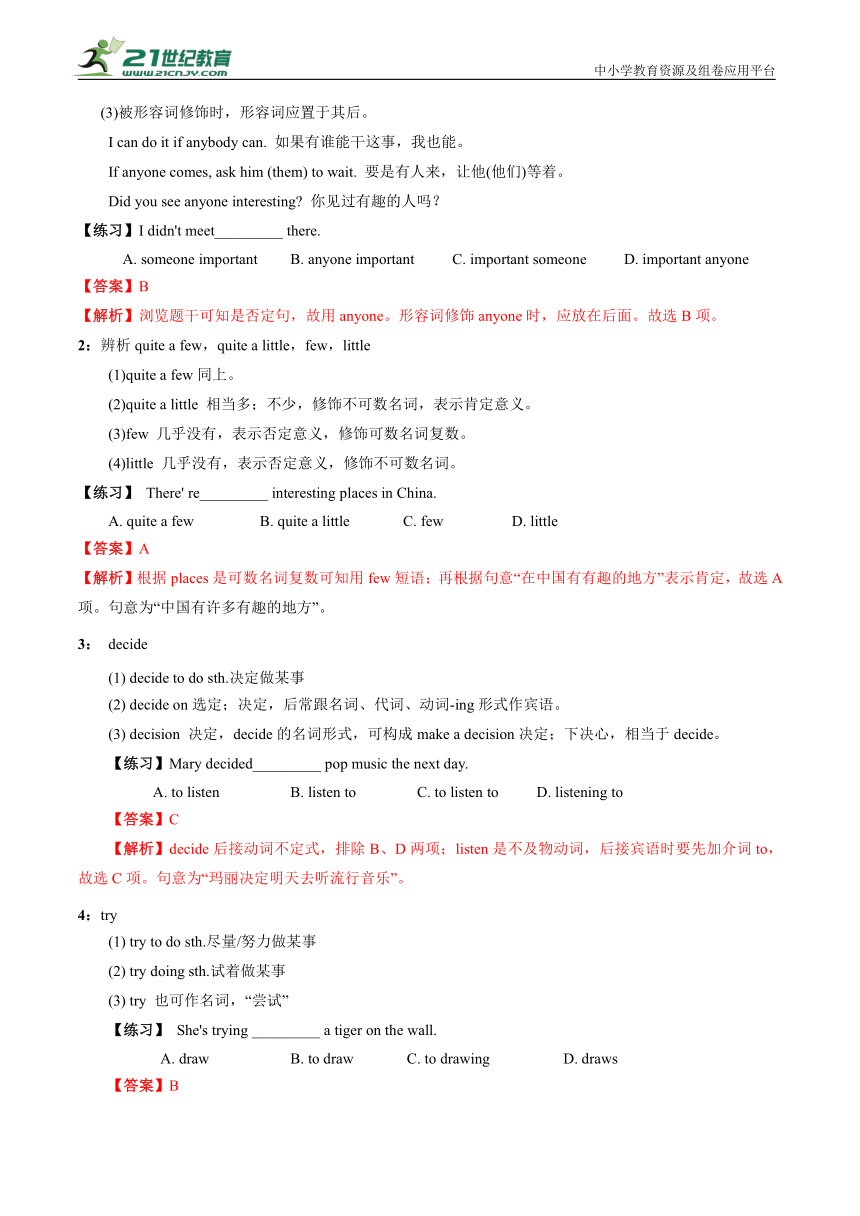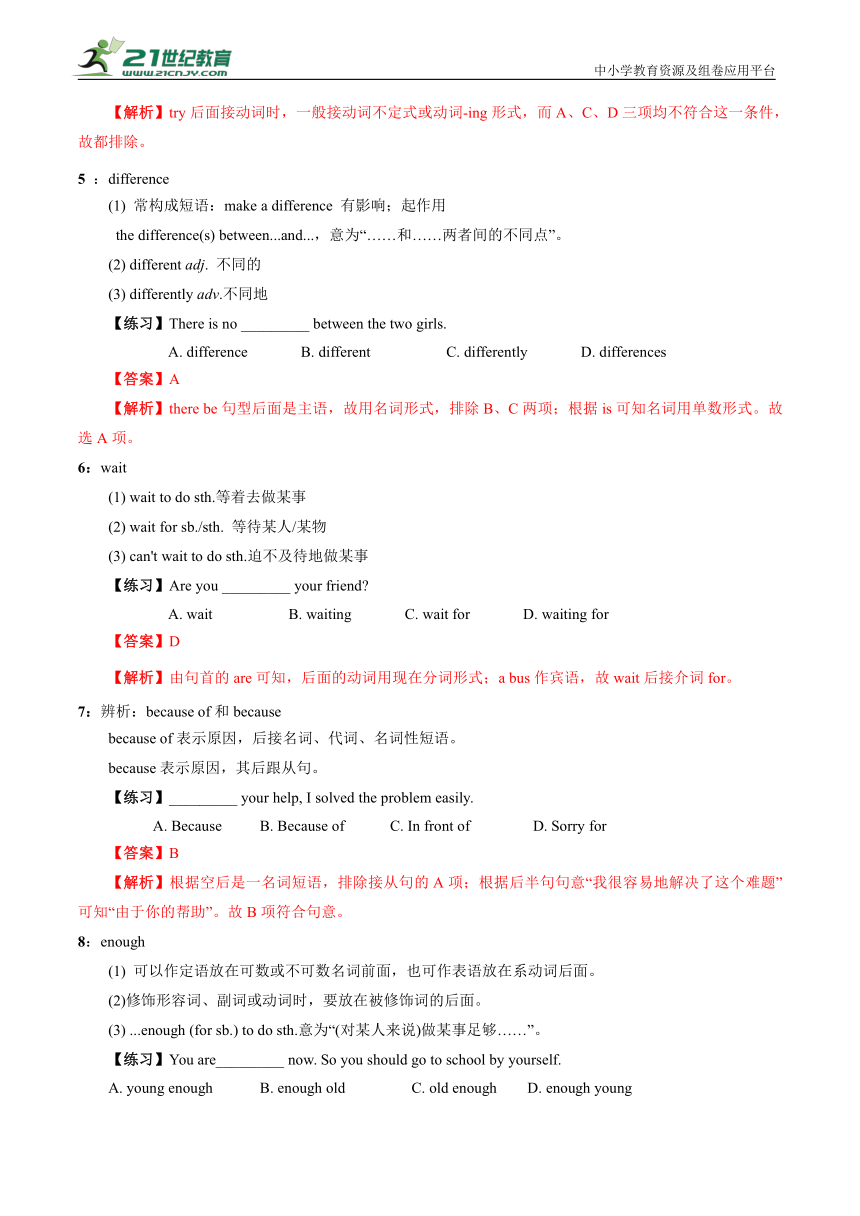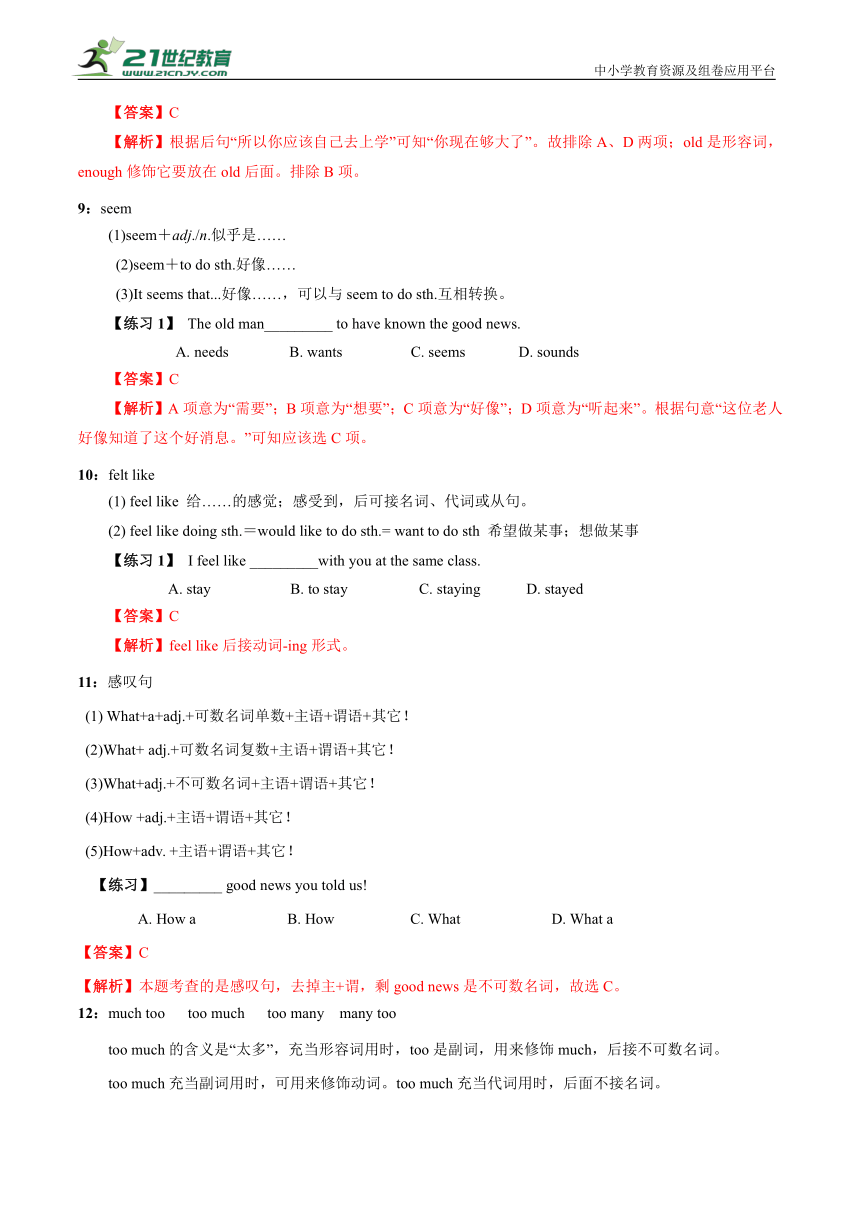人教八年级上册Unit 1 Where did you go on vacation? 知识梳理与精练(含答案)
文档属性
| 名称 | 人教八年级上册Unit 1 Where did you go on vacation? 知识梳理与精练(含答案) |  | |
| 格式 | docx | ||
| 文件大小 | 3.3MB | ||
| 资源类型 | 试卷 | ||
| 版本资源 | 人教新目标(Go for it)版 | ||
| 科目 | 英语 | ||
| 更新时间 | 2023-11-12 23:11:27 | ||
图片预览




文档简介
中小学教育资源及组卷应用平台
2023 初中英语
八年级上册:Unit 1 知识梳理与精练
一.单词学习
2023 初中英语
中小学教育资源及组卷应用平台
anyone任何人
anywhere在任何地方
wonderful精彩的;绝妙的
few不多;很少
quite a few相当多;不少
most最多;大多数
something某事;某物
nothing没有什么;没有一件东西
everyone每人人人;所有人
of course当然;自然
myself.我自己;我本人
yourself你自己;您自己
hen母鸡
pig猪
seem好像;似乎;看来
bored厌倦的烦闷的
someone某人
diary日记;记事簿
enjoyable有乐趣的;令人愉快的
activity活动
decide决定;选定
try尝试;设法;努力
paragliding滑翔伞运动
feel like给…的感觉;感受到
bird鸟
bicycle自行车;脚踏车
building建筑物;房子
trader商人
wonder想知道;琢磨
difference差别;差异
top顶部;表面
wait等待;等候
umbrella伞;雨企
wet湿的;潮湿的,下雨的
because of因为
below在下面;到…下面
enough足够的(地充足的(地);充分的(地)
hungry饥饿的
as像.....样;如同
hill小山;山丘
duck鸭
dislike不喜爱(的事物);厌恶(的事物
2023 初中英语
2023 初中英语
二.知识解析
1:anyone
(1)表示“某人”,常用于否定句、疑问句及条件句。表示“任何人”时,用于肯定句。
2023 初中英语
2023 初中英语
(2)用作主语,谓语动词用单数;若需用代词代替,可用单数he,him或复数they,them均可。
(3)被形容词修饰时,形容词应置于其后。
I can do it if anybody can. 如果有谁能干这事,我也能。
If anyone comes, ask him (them) to wait. 要是有人来,让他(他们)等着。
Did you see anyone interesting 你见过有趣的人吗?
【练习】I didn't meet_________ there.
A. someone important B. anyone important C. important someone D. important anyone
【答案】B
【解析】浏览题干可知是否定句,故用anyone。形容词修饰anyone时,应放在后面。故选B项。
2:辨析quite a few,quite a little,few,little
(1)quite a few同上。
(2)quite a little 相当多;不少,修饰不可数名词,表示肯定意义。
(3)few 几乎没有,表示否定意义,修饰可数名词复数。
(4)little 几乎没有,表示否定意义,修饰不可数名词。
【练习】 There' re_________ interesting places in China.
A. quite a few B. quite a little C. few D. little
【答案】A
【解析】根据places是可数名词复数可知用few短语;再根据句意“在中国有有趣的地方”表示肯定,故选A项。句意为“中国有许多有趣的地方”。
3: decide
(1) decide to do sth.决定做某事
(2) decide on选定;决定,后常跟名词、代词、动词 ing形式作宾语。
(3) decision 决定,decide的名词形式,可构成make a decision决定;下决心,相当于decide。
【练习】Mary decided_________ pop music the next day.
A. to listen B. listen to C. to listen to D. listening to
【答案】C
【解析】decide后接动词不定式,排除B、D两项;listen是不及物动词,后接宾语时要先加介词to,故选C项。句意为“玛丽决定明天去听流行音乐”。
4:try
(1) try to do sth.尽量/努力做某事
(2) try doing sth.试着做某事
(3) try 也可作名词,“尝试”
【练习】 She's trying _________ a tiger on the wall.
A. draw B. to draw C. to drawing D. draws
中小学教育资源及组卷应用平台
2023 初中英语
【答案】B
【解析】try后面接动词时,一般接动词不定式或动词 ing形式,而A、C、D三项均不符合这一条件,故都排除。
5 :difference
(1) 常构成短语:make a difference 有影响;起作用
the difference(s) between...and...,意为“……和……两者间的不同点”。
(2) different adj. 不同的
(3) differently adv.不同地
【练习】There is no _________ between the two girls.
A. difference B. different C. differently D. differences
【答案】A
【解析】there be句型后面是主语,故用名词形式,排除B、C两项;根据is可知名词用单数形式。故选A项。
6:wait
(1) wait to do sth.等着去做某事
(2) wait for sb./sth. 等待某人/某物
(3) can't wait to do sth.迫不及待地做某事
【练习】Are you _________ your friend
A. wait B. waiting C. wait for D. waiting for
【答案】D
【解析】由句首的are可知,后面的动词用现在分词形式;a bus作宾语,故wait后接介词for。
7:辨析:because of和because
because of表示原因,后接名词、代词、名词性短语。
because表示原因,其后跟从句。
【练习】_________ your help, I solved the problem easily.
A. Because B. Because of C. In front of D. Sorry for
【答案】B
【解析】根据空后是一名词短语,排除接从句的A项;根据后半句句意“我很容易地解决了这个难题”可知“由于你的帮助”。故B项符合句意。
8:enough
(1) 可以作定语放在可数或不可数名词前面,也可作表语放在系动词后面。
(2)修饰形容词、副词或动词时,要放在被修饰词的后面。
(3) ...enough (for sb.) to do sth.意为“(对某人来说)做某事足够……”。
【练习】You are_________ now. So you should go to school by yourself.
2023 初中英语
中小学教育资源及组卷应用平台
A. young enough B. enough old C. old enough D. enough young
【答案】C
【解析】根据后句“所以你应该自己去上学”可知“你现在够大了”。故排除A、D两项;old是形容词,enough修饰它要放在old后面。排除B项。
9:seem
(1)seem+adj./n.似乎是……
(2)seem+to do sth.好像……
(3)It seems that...好像……,可以与seem to do sth.互相转换。
【练习1】 The old man_________ to have known the good news.
A. needs B. wants C. seems D. sounds
【答案】C
【解析】A项意为“需要”;B项意为“想要”;C项意为“好像”;D项意为“听起来”。根据句意“这位老人好像知道了这个好消息。”可知应该选C项。
10:felt like
(1) feel like 给……的感觉;感受到,后可接名词、代词或从句。
(2) feel like doing sth.=would like to do sth.= want to do sth 希望做某事;想做某事
【练习1】 I feel like _________with you at the same class.
A. stay B. to stay C. staying D. stayed
【答案】C
【解析】feel like后接动词 ing形式。
11:感叹句
(1) What+a+adj.+可数名词单数+主语+谓语+其它!
(2)What+ adj.+可数名词复数+主语+谓语+其它!
(3)What+adj.+不可数名词+主语+谓语+其它!
(4)How +adj.+主语+谓语+其它!
(5)How+adv. +主语+谓语+其它!
【练习】_________ good news you told us!
A. How a B. How C. What D. What a
【答案】C
【解析】本题考查的是感叹句,去掉主+谓,剩good news是不可数名词,故选C。
12:much too too much too many many too
too much的含义是“太多”,充当形容词用时,too是副词,用来修饰much,后接不可数名词。
中小学教育资源及组卷应用平台
2023 初中英语
too much充当副词用时,可用来修饰动词。too much充当代词用时,后面不接名词。
much too意为“太”,much(副词)用来修饰too,只起副词作用,在句中修饰形容词或副词。
too many的中心词是many,用法与many相同,用来修饰复数可数名词。例如:
一般没有many too这种用法。
【练习】These shoes are_________ big for me.
A. too many B. too much C. much too D. many too
【答案】C
【解析】much too意为“太”,在句中修饰形容词或副词。big是形容词,故选C
13:反身代词
反身代词的常见搭配:
enjoy oneself=have fun =have a good time玩得高兴
teach oneself=learn …by oneself 自学 by oneself 独自
help oneself to 随便吃 introduce oneself to 自我介绍
1.---I’ll have a tennis game tomorrow. I’m a little bit nervous.
---Believe in_________. You’re the best in our club.
A. herself B. myself C. yourself D. himself
【答案】C
【解析】由题意知,相信自己,所以用反身代词,而且是第二人称,故选C
2.---Jim, please help_________ to some bread .
---Thank you.
A. himself B. yourself C. herself D. myself
【答案】B
【解析】题意为“请随便吃一下面包”help oneself to 随便吃,故选B
14. no one意为"没有人",与nobody同义
There is no one/nobody in the classroom now. 现在教室里没有人。
Everyone wants to be a hero, but no one wants to die. 人人都想当一名英雄,但没有人想死。
2023 初中英语
中小学教育资源及组卷应用平台
【易混辨析】 no one,none与nothing
no one 只能用于指人,不能与of连用。作主语时,谓语动词只能用单数形式。可表示"没有人",一般用来回答who引导的特殊疑问句。 No one wants to go shopping. 没有一个人想去购物。
none 表示"没有一个"。既可指人,也可指物。其后可接of短语,"none of+可数名词复数"作主语时谓语动词用单、复数皆可。可指数量上"一个也没有",一般用来回答how many/much引导的特殊疑问句。 None of these pens work/works. 这些钢笔没有一支能用。
nothing 只能用于指物,作主语时,谓语动词只能用单数形式。可用来回答what 引导的特殊疑问句及含anything的一般疑问句。 —What is in the box 箱子里有 什么? —Nothing. 什么东西也没有。
15. ...so we decided to go to the beach near our hotel. ……因此我们决定去旅馆附近的海滩。
decide及物动词,意为"决定,决心",常见用法有:
(1)decided to do sth意为"决定做某事",其否定形式为decide not to do sth,意为"决定不做某事"。
He decided that he would start out at 6:00 that morning.
他决定那天早晨六点出发。
(2)decide后常跟"疑问词+动词不定式"作宾语。
He cannot decide when to leave.
他不能决定何时动身。
(3)decide后常跟宾语从句。
I can’t decide where I should go.
我不能决定我该去哪儿。
中小学教育资源及组卷应用平台
2023 初中英语
【知识拓展】
① decide也可作不及物动词,decide on sth意为"就某事做决定",后常跟名词、 代词、动词的 ing形式作宾语。 Betty decided on the red skirt. 贝蒂选定了那条红裙子。 Don’t decide on important matters so quickly. 重要的事情不要匆忙做决定。 ② decision为名词,意为"决定"。make a decision意为"做决定",相当于decide。 I made a decision to read English every day. 我决定每天读英语。 She decided/made a decision to get good grades. 她决定取得好成绩。 ③ decide not to do sth. 决定不做某事。 He decided not to tell his mother the truth. 他决定不告诉他妈妈真相。 ④ decide后跟"疑问词+不定式"作其宾语。 I can’t decide what to buy. 我不能决定买什么。
随堂练习
一.词汇运用
A)用方框中所给单词的适当形式填空,每词限用一次,每空限填一词。
1.In my spare time,I like to keep .
2.We often go to the in many countries.
3.I think this is the most journey.
4.You are a clever boy.I think you can do it by .
5.Dan to eat lots of vegetables to keep healthy.
【答案】1.diaries2.beach3.enjoyable4.yourself5.tries
B)根据汉语提示在空白处写出单词的正确形式,每空限一词。
2023 初中英语
中小学教育资源及组卷应用平台
We need love.We also need to love.The person I love most is my mother.My mother is 41 years old.She is of medium build with long black hair.She is quiet.She has some 1. (差异) from other mothers.She has no job.She just 2. (待) at home.
She did a lot for me when I was a child.She 3. (买) whatever I needed for my study,even though she didn't have 4. (足够的) money.She sent me from piano lessons to dancing lessons at the 5. (周末).She cooked healthy food for me.It 6. (尝起来) so delicious.
When I grow up,I will do what I can do to make my mother happy.I will be one of the greatest 57. (商人) after I leave school.I'll save money and buy beautiful clothes that make her look still young.I'll live in a tall 8. (高楼) with my mother.I'll take her to 9. (绝妙的) places around China.Of 60. (当然),I will stay with her when I have free time.That's what she wants most,I think.
【答案】1.differences2.stays3.bought4.enough 5.weekend6.tasted7.traders8.building 9.wonderful10.course
二.语法填空
阅读下面短文,按照句子的语法结构和上下文连贯的要求,在空白处填入适当的词或用括号中所给词的正确形式填空,每空不超过三个词。
I often travel by train to some places 1. interest.This summer I decided 2. (take) a train trip to the countryside.
Then one day,I got on a train and took a seat 3. the window.At first,the train moved along slowly and gradually gained its speed.We went 4. a number of tunnels (隧道),crossed some bridges and came in the countryside.
It was a 5. (sun) day and the scenery (风景) outside was wonderful.There were green fields everywhere.We could see farmers 6. (work) busily in the fields and some children 7. (play) under the trees.They waved to us as the train went by.The train ran across a bridge.Under the bridge a group of ducks enjoyed 8. (them).They heard the noise of the train and hurried off.
I looked 9. of the window.After a while,I closed my eyes and started 10. (make) plans for my next vacation.
【答案】1.of 2.to take3.by4.through5.sunny6.working7.playing8.themselves 9.out10.to make
2023 初中英语
八年级上册:Unit 1 知识梳理与精练
一.单词学习
2023 初中英语
中小学教育资源及组卷应用平台
anyone任何人
anywhere在任何地方
wonderful精彩的;绝妙的
few不多;很少
quite a few相当多;不少
most最多;大多数
something某事;某物
nothing没有什么;没有一件东西
everyone每人人人;所有人
of course当然;自然
myself.我自己;我本人
yourself你自己;您自己
hen母鸡
pig猪
seem好像;似乎;看来
bored厌倦的烦闷的
someone某人
diary日记;记事簿
enjoyable有乐趣的;令人愉快的
activity活动
decide决定;选定
try尝试;设法;努力
paragliding滑翔伞运动
feel like给…的感觉;感受到
bird鸟
bicycle自行车;脚踏车
building建筑物;房子
trader商人
wonder想知道;琢磨
difference差别;差异
top顶部;表面
wait等待;等候
umbrella伞;雨企
wet湿的;潮湿的,下雨的
because of因为
below在下面;到…下面
enough足够的(地充足的(地);充分的(地)
hungry饥饿的
as像.....样;如同
hill小山;山丘
duck鸭
dislike不喜爱(的事物);厌恶(的事物
2023 初中英语
2023 初中英语
二.知识解析
1:anyone
(1)表示“某人”,常用于否定句、疑问句及条件句。表示“任何人”时,用于肯定句。
2023 初中英语
2023 初中英语
(2)用作主语,谓语动词用单数;若需用代词代替,可用单数he,him或复数they,them均可。
(3)被形容词修饰时,形容词应置于其后。
I can do it if anybody can. 如果有谁能干这事,我也能。
If anyone comes, ask him (them) to wait. 要是有人来,让他(他们)等着。
Did you see anyone interesting 你见过有趣的人吗?
【练习】I didn't meet_________ there.
A. someone important B. anyone important C. important someone D. important anyone
【答案】B
【解析】浏览题干可知是否定句,故用anyone。形容词修饰anyone时,应放在后面。故选B项。
2:辨析quite a few,quite a little,few,little
(1)quite a few同上。
(2)quite a little 相当多;不少,修饰不可数名词,表示肯定意义。
(3)few 几乎没有,表示否定意义,修饰可数名词复数。
(4)little 几乎没有,表示否定意义,修饰不可数名词。
【练习】 There' re_________ interesting places in China.
A. quite a few B. quite a little C. few D. little
【答案】A
【解析】根据places是可数名词复数可知用few短语;再根据句意“在中国有有趣的地方”表示肯定,故选A项。句意为“中国有许多有趣的地方”。
3: decide
(1) decide to do sth.决定做某事
(2) decide on选定;决定,后常跟名词、代词、动词 ing形式作宾语。
(3) decision 决定,decide的名词形式,可构成make a decision决定;下决心,相当于decide。
【练习】Mary decided_________ pop music the next day.
A. to listen B. listen to C. to listen to D. listening to
【答案】C
【解析】decide后接动词不定式,排除B、D两项;listen是不及物动词,后接宾语时要先加介词to,故选C项。句意为“玛丽决定明天去听流行音乐”。
4:try
(1) try to do sth.尽量/努力做某事
(2) try doing sth.试着做某事
(3) try 也可作名词,“尝试”
【练习】 She's trying _________ a tiger on the wall.
A. draw B. to draw C. to drawing D. draws
中小学教育资源及组卷应用平台
2023 初中英语
【答案】B
【解析】try后面接动词时,一般接动词不定式或动词 ing形式,而A、C、D三项均不符合这一条件,故都排除。
5 :difference
(1) 常构成短语:make a difference 有影响;起作用
the difference(s) between...and...,意为“……和……两者间的不同点”。
(2) different adj. 不同的
(3) differently adv.不同地
【练习】There is no _________ between the two girls.
A. difference B. different C. differently D. differences
【答案】A
【解析】there be句型后面是主语,故用名词形式,排除B、C两项;根据is可知名词用单数形式。故选A项。
6:wait
(1) wait to do sth.等着去做某事
(2) wait for sb./sth. 等待某人/某物
(3) can't wait to do sth.迫不及待地做某事
【练习】Are you _________ your friend
A. wait B. waiting C. wait for D. waiting for
【答案】D
【解析】由句首的are可知,后面的动词用现在分词形式;a bus作宾语,故wait后接介词for。
7:辨析:because of和because
because of表示原因,后接名词、代词、名词性短语。
because表示原因,其后跟从句。
【练习】_________ your help, I solved the problem easily.
A. Because B. Because of C. In front of D. Sorry for
【答案】B
【解析】根据空后是一名词短语,排除接从句的A项;根据后半句句意“我很容易地解决了这个难题”可知“由于你的帮助”。故B项符合句意。
8:enough
(1) 可以作定语放在可数或不可数名词前面,也可作表语放在系动词后面。
(2)修饰形容词、副词或动词时,要放在被修饰词的后面。
(3) ...enough (for sb.) to do sth.意为“(对某人来说)做某事足够……”。
【练习】You are_________ now. So you should go to school by yourself.
2023 初中英语
中小学教育资源及组卷应用平台
A. young enough B. enough old C. old enough D. enough young
【答案】C
【解析】根据后句“所以你应该自己去上学”可知“你现在够大了”。故排除A、D两项;old是形容词,enough修饰它要放在old后面。排除B项。
9:seem
(1)seem+adj./n.似乎是……
(2)seem+to do sth.好像……
(3)It seems that...好像……,可以与seem to do sth.互相转换。
【练习1】 The old man_________ to have known the good news.
A. needs B. wants C. seems D. sounds
【答案】C
【解析】A项意为“需要”;B项意为“想要”;C项意为“好像”;D项意为“听起来”。根据句意“这位老人好像知道了这个好消息。”可知应该选C项。
10:felt like
(1) feel like 给……的感觉;感受到,后可接名词、代词或从句。
(2) feel like doing sth.=would like to do sth.= want to do sth 希望做某事;想做某事
【练习1】 I feel like _________with you at the same class.
A. stay B. to stay C. staying D. stayed
【答案】C
【解析】feel like后接动词 ing形式。
11:感叹句
(1) What+a+adj.+可数名词单数+主语+谓语+其它!
(2)What+ adj.+可数名词复数+主语+谓语+其它!
(3)What+adj.+不可数名词+主语+谓语+其它!
(4)How +adj.+主语+谓语+其它!
(5)How+adv. +主语+谓语+其它!
【练习】_________ good news you told us!
A. How a B. How C. What D. What a
【答案】C
【解析】本题考查的是感叹句,去掉主+谓,剩good news是不可数名词,故选C。
12:much too too much too many many too
too much的含义是“太多”,充当形容词用时,too是副词,用来修饰much,后接不可数名词。
中小学教育资源及组卷应用平台
2023 初中英语
too much充当副词用时,可用来修饰动词。too much充当代词用时,后面不接名词。
much too意为“太”,much(副词)用来修饰too,只起副词作用,在句中修饰形容词或副词。
too many的中心词是many,用法与many相同,用来修饰复数可数名词。例如:
一般没有many too这种用法。
【练习】These shoes are_________ big for me.
A. too many B. too much C. much too D. many too
【答案】C
【解析】much too意为“太”,在句中修饰形容词或副词。big是形容词,故选C
13:反身代词
反身代词的常见搭配:
enjoy oneself=have fun =have a good time玩得高兴
teach oneself=learn …by oneself 自学 by oneself 独自
help oneself to 随便吃 introduce oneself to 自我介绍
1.---I’ll have a tennis game tomorrow. I’m a little bit nervous.
---Believe in_________. You’re the best in our club.
A. herself B. myself C. yourself D. himself
【答案】C
【解析】由题意知,相信自己,所以用反身代词,而且是第二人称,故选C
2.---Jim, please help_________ to some bread .
---Thank you.
A. himself B. yourself C. herself D. myself
【答案】B
【解析】题意为“请随便吃一下面包”help oneself to 随便吃,故选B
14. no one意为"没有人",与nobody同义
There is no one/nobody in the classroom now. 现在教室里没有人。
Everyone wants to be a hero, but no one wants to die. 人人都想当一名英雄,但没有人想死。
2023 初中英语
中小学教育资源及组卷应用平台
【易混辨析】 no one,none与nothing
no one 只能用于指人,不能与of连用。作主语时,谓语动词只能用单数形式。可表示"没有人",一般用来回答who引导的特殊疑问句。 No one wants to go shopping. 没有一个人想去购物。
none 表示"没有一个"。既可指人,也可指物。其后可接of短语,"none of+可数名词复数"作主语时谓语动词用单、复数皆可。可指数量上"一个也没有",一般用来回答how many/much引导的特殊疑问句。 None of these pens work/works. 这些钢笔没有一支能用。
nothing 只能用于指物,作主语时,谓语动词只能用单数形式。可用来回答what 引导的特殊疑问句及含anything的一般疑问句。 —What is in the box 箱子里有 什么? —Nothing. 什么东西也没有。
15. ...so we decided to go to the beach near our hotel. ……因此我们决定去旅馆附近的海滩。
decide及物动词,意为"决定,决心",常见用法有:
(1)decided to do sth意为"决定做某事",其否定形式为decide not to do sth,意为"决定不做某事"。
He decided that he would start out at 6:00 that morning.
他决定那天早晨六点出发。
(2)decide后常跟"疑问词+动词不定式"作宾语。
He cannot decide when to leave.
他不能决定何时动身。
(3)decide后常跟宾语从句。
I can’t decide where I should go.
我不能决定我该去哪儿。
中小学教育资源及组卷应用平台
2023 初中英语
【知识拓展】
① decide也可作不及物动词,decide on sth意为"就某事做决定",后常跟名词、 代词、动词的 ing形式作宾语。 Betty decided on the red skirt. 贝蒂选定了那条红裙子。 Don’t decide on important matters so quickly. 重要的事情不要匆忙做决定。 ② decision为名词,意为"决定"。make a decision意为"做决定",相当于decide。 I made a decision to read English every day. 我决定每天读英语。 She decided/made a decision to get good grades. 她决定取得好成绩。 ③ decide not to do sth. 决定不做某事。 He decided not to tell his mother the truth. 他决定不告诉他妈妈真相。 ④ decide后跟"疑问词+不定式"作其宾语。 I can’t decide what to buy. 我不能决定买什么。
随堂练习
一.词汇运用
A)用方框中所给单词的适当形式填空,每词限用一次,每空限填一词。
1.In my spare time,I like to keep .
2.We often go to the in many countries.
3.I think this is the most journey.
4.You are a clever boy.I think you can do it by .
5.Dan to eat lots of vegetables to keep healthy.
【答案】1.diaries2.beach3.enjoyable4.yourself5.tries
B)根据汉语提示在空白处写出单词的正确形式,每空限一词。
2023 初中英语
中小学教育资源及组卷应用平台
We need love.We also need to love.The person I love most is my mother.My mother is 41 years old.She is of medium build with long black hair.She is quiet.She has some 1. (差异) from other mothers.She has no job.She just 2. (待) at home.
She did a lot for me when I was a child.She 3. (买) whatever I needed for my study,even though she didn't have 4. (足够的) money.She sent me from piano lessons to dancing lessons at the 5. (周末).She cooked healthy food for me.It 6. (尝起来) so delicious.
When I grow up,I will do what I can do to make my mother happy.I will be one of the greatest 57. (商人) after I leave school.I'll save money and buy beautiful clothes that make her look still young.I'll live in a tall 8. (高楼) with my mother.I'll take her to 9. (绝妙的) places around China.Of 60. (当然),I will stay with her when I have free time.That's what she wants most,I think.
【答案】1.differences2.stays3.bought4.enough 5.weekend6.tasted7.traders8.building 9.wonderful10.course
二.语法填空
阅读下面短文,按照句子的语法结构和上下文连贯的要求,在空白处填入适当的词或用括号中所给词的正确形式填空,每空不超过三个词。
I often travel by train to some places 1. interest.This summer I decided 2. (take) a train trip to the countryside.
Then one day,I got on a train and took a seat 3. the window.At first,the train moved along slowly and gradually gained its speed.We went 4. a number of tunnels (隧道),crossed some bridges and came in the countryside.
It was a 5. (sun) day and the scenery (风景) outside was wonderful.There were green fields everywhere.We could see farmers 6. (work) busily in the fields and some children 7. (play) under the trees.They waved to us as the train went by.The train ran across a bridge.Under the bridge a group of ducks enjoyed 8. (them).They heard the noise of the train and hurried off.
I looked 9. of the window.After a while,I closed my eyes and started 10. (make) plans for my next vacation.
【答案】1.of 2.to take3.by4.through5.sunny6.working7.playing8.themselves 9.out10.to make
同课章节目录
- Unit 1 Where did you go on vacation?
- Section A
- Section B
- Unit 2 How often do you exercise?
- Section A
- Section B
- Unit 3 I'm more outgoing than my sister.
- Section A
- Section B
- Unit 4 What's the best movie theater?
- Section A
- Section B
- Unit 5 Do you want to watch a game show?
- Section A
- Section B
- Unit 6 I'm going to study computer science.
- Section A
- Section B
- Unit 7 Will people have robots?
- Section A
- Section B
- Unit 8 How do you make a banana milk shake?
- Section A
- Section B
- Unit 9 Can you come to my party?
- Section A
- Section B
- Unit 10 If you go to the party, you'll have a grea
- Section A
- Section B
